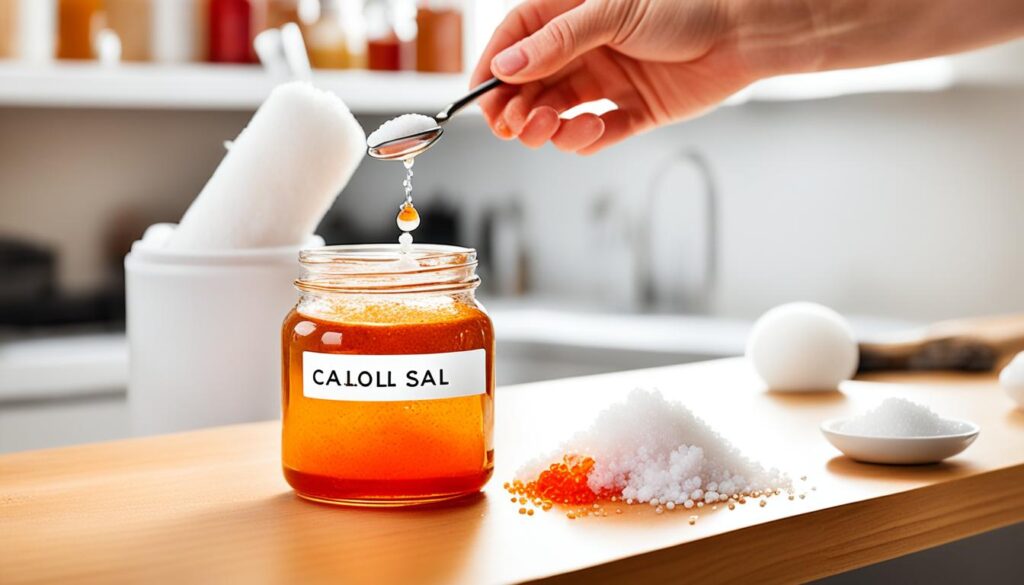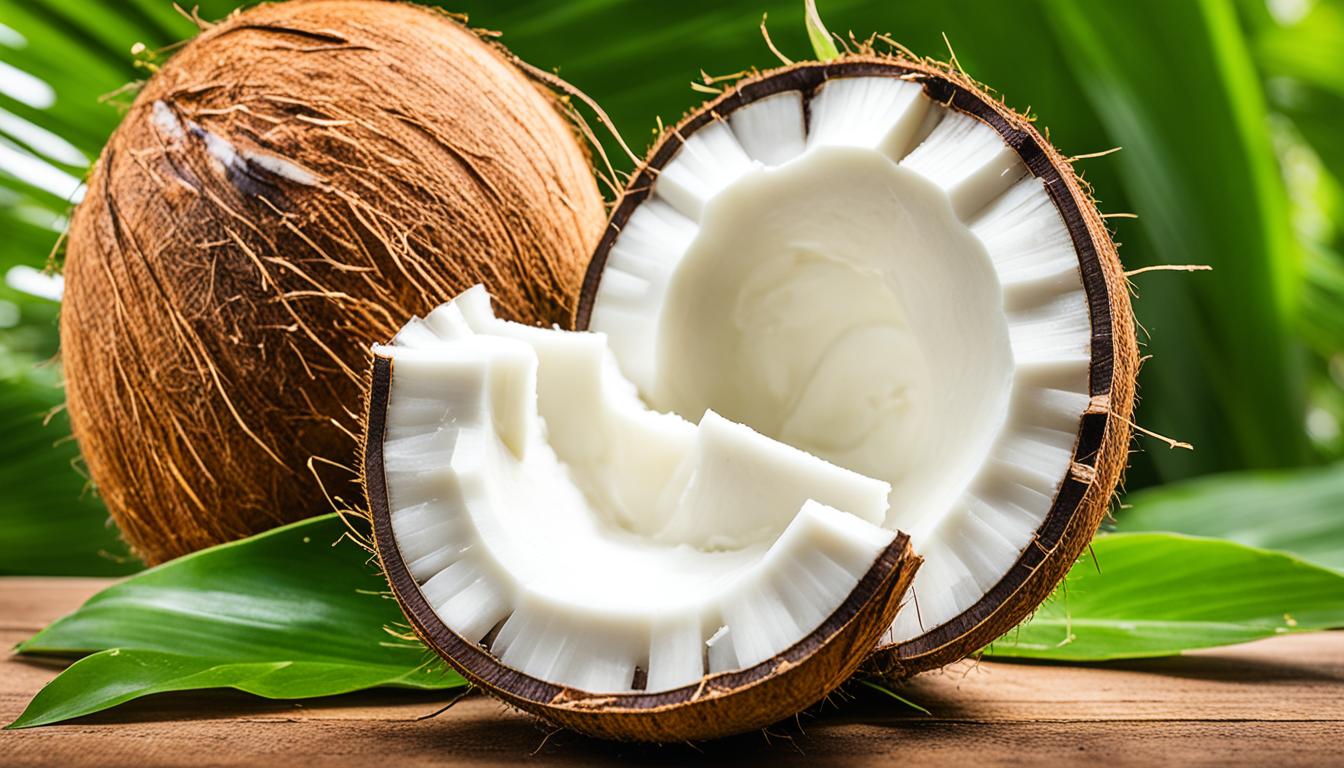Ringworm is a common fungal infection that can cause itchy, red, scaly, and circular patches on the skin. While there are many medications available to treat ringworm, natural remedies can also be effective. Garlic, apple cider vinegar, and turmeric are some of the natural treatments that have shown promising results in treating fungal infections like ringworm. Other remedies, such as soapy water, aloe vera, coconut oil, grapefruit seed extract, tea tree oil, oil of oregano, and lemongrass oil, have also been found to have antifungal properties. Licorice powder can be made into a paste and applied to the affected area, while powdered licorice extract can be mixed with water and used as a paste. It is important to note that if symptoms persist or worsen, it is recommended to consult a doctor for further treatment options.
Key Takeaways:
- Natural remedies can be effective in treating ringworm and clearing skin infections.
- Garlic, apple cider vinegar, and turmeric have shown promising results in treating ringworm.
- Other natural remedies like aloe vera, coconut oil, tea tree oil, and licorice extract can also be used to treat ringworm.
- It is important to consult a doctor if symptoms persist or worsen.
- Practice good hygiene and avoid sharing personal items to prevent the spread of ringworm.
Garlic as a Natural Treatment for Ringworm
Garlic has long been recognized for its powerful antifungal properties, making it an effective natural remedy for treating ringworm. Not only does garlic have the ability to combat ringworm, but it can also be used to address other types of fungal infections.
To harness the benefits of garlic in treating ringworm, you can create a homemade paste by crushing garlic cloves and blending them with olive or coconut oil. The oil helps to dilute the garlic and make it easier to apply to the affected skin. Once you have made the paste, follow these steps:
- Clean the affected area: Before applying the garlic paste, make sure to clean the ringworm patch thoroughly. Gently wash the area with mild soap and warm water, then pat it dry with a clean towel.
- Apply the garlic paste: Using clean hands or a cotton swab, apply a thin layer of the garlic paste directly onto the affected skin.
- Cover with a bandage or gauze: To ensure that the garlic paste remains in place and has maximum contact with the ringworm, cover it with a bandage or gauze. This will also help prevent the spread of infection.
- Leave it on for up to 2 hours: Allow the garlic paste to work its magic by leaving it on your skin for up to 2 hours. This will give the antifungal properties of garlic enough time to penetrate the ringworm and combat the infection.
- Rinse thoroughly: After 2 hours, rinse off the garlic paste using warm water. Make sure to remove any residue and gently pat the area dry.
To effectively clear the ringworm infection, repeat this process twice daily until the symptoms completely resolve. However, it is essential to be cautious while using garlic as a treatment. If the garlic paste causes any irritation or discomfort, it should be rinsed off immediately and not reapplied.
Apple Cider Vinegar for Treating Ringworm
When it comes to natural treatments for ringworm, apple cider vinegar is a popular choice. Apple cider vinegar contains antifungal properties that can help fight fungal infections like ringworm. Here’s how to use apple cider vinegar to treat ringworm:
- Soak a cotton wool pad in undiluted apple cider vinegar.
- Apply the soaked cotton pad directly to the affected area.
- Leave it on for about 10 minutes.
- Repeat this process up to 3 times daily.
Apple cider vinegar may cause a stinging sensation or skin irritation in some individuals. If you experience any discomfort, rinse off the vinegar immediately and do not reapply it.
Remember, while apple cider vinegar can be an effective natural treatment for ringworm, it is important to consult a healthcare professional if your symptoms persist or worsen.

Takeaway Tips:
- Apple cider vinegar has antifungal properties that can help treat ringworm.
- Soak a cotton wool pad in undiluted apple cider vinegar and apply it directly to the affected area.
- Repeat this process up to 3 times daily.
- If apple cider vinegar causes any discomfort, rinse off immediately and do not reapply.
- Consult a healthcare professional if symptoms persist or worsen.
Now that you know how to use apple cider vinegar for ringworm, let’s explore another natural remedy: aloe vera.
Aloe Vera as a Natural Remedy for Ringworm
Aloe vera, a versatile plant known for its healing properties, offers a natural solution for treating ringworm. With its antibacterial, antifungal, and anti-inflammatory properties, aloe vera gel can effectively combat the fungal infection while soothing irritated skin.
To use aloe vera for ringworm, follow these steps:
- Obtain a fresh aloe vera leaf or choose a commercially available aloe vera gel with a high concentration of aloe vera.
- Wash the affected area gently with mild soap and water, then pat it dry.
- Cut open the aloe vera leaf and extract the gel using a spoon. Alternatively, squeeze out a small amount of the aloe vera gel from the tube.
- Apply the gel directly onto the ringworm patch, making sure to cover the entire affected area.
- Gently massage the gel into the skin using circular motions for better absorption.
- Repeat the application three to four times daily for optimal results.
Aloe vera not only combats the fungal infection but also provides relief from the itching and inflammation associated with ringworm. However, it is important to note that some individuals may experience allergic reactions to aloe vera. If you notice any irritation or discomfort, discontinue use and consult a doctor for alternative treatment options.
Embrace the healing power of aloe vera and harness its natural antifungal properties to effectively treat ringworm. The soothing gel can bring relief to your skin while promoting healing. It’s time to turn to nature for a gentle yet powerful remedy.
| Aloe Vera Benefits for Ringworm: | Aloe Vera Precautions: |
|---|---|
|
|
Coconut Oil as a Natural Treatment for Ringworm
Coconut oil, with its fatty acids, is believed to possess antifungal properties that make it a potential remedy for ringworm. When using coconut oil for ringworm, apply liquid coconut oil directly to the affected area three times a day. The oil can be gently massaged into the skin for better absorption.
Coconut oil can also double as a moisturizing lotion to help prevent future ringworm infections. Apply a thin layer of coconut oil to clean, dry skin to keep it hydrated and create a barrier against fungal growth. Regular use of coconut oil as a moisturizer can be beneficial for both preventing and managing ringworm.
It is essential to be aware that coconut oil may cause skin irritation or allergic reactions in some individuals. If you experience any discomfort or irritation after applying coconut oil, discontinue use and consult a healthcare professional for further guidance.
| Pros of Using Coconut Oil for Ringworm | Cons of Using Coconut Oil for Ringworm |
|---|---|
|
|
While coconut oil can be a promising natural treatment for ringworm, it is crucial to monitor its effectiveness and watch for any adverse reactions. If your symptoms persist or worsen, it is recommended to consult a doctor for further evaluation and treatment options.

Tea Tree Oil for Treating Ringworm
Tea tree oil is a popular natural remedy for various skin conditions, including ringworm. Known for its antimicrobial properties, tea tree oil has long been used as a traditional remedy for both bacterial and fungal infections. When used properly, tea tree oil can help alleviate the symptoms of ringworm and promote healing.
To use tea tree oil for ringworm, it is recommended to dilute it to a 2 percent concentration. This can be achieved by mixing one part tea tree oil with nine parts carrier oil, such as coconut oil. Diluting the tea tree oil helps reduce the risk of skin irritation, especially for those with sensitive skin.
Apply the diluted tea tree oil directly to the affected area three times a day. Gently massage the oil into the skin to ensure even distribution. This treatment can help soothe the itching, reduce redness, and promote faster healing. However, it is important to note that tea tree oil may cause skin irritation in some individuals. If any irritation occurs, discontinue use and consult a doctor.
Note: If you are pregnant or have any underlying medical conditions, it is advisable to consult with a healthcare professional before using tea tree oil or any other natural remedies.
“Tea tree oil is a natural antifungal agent that can effectively combat ringworm infections. Diluting it in a carrier oil helps reduce the risk of skin irritation, making it suitable for individuals with sensitive skin.”
Potential Side Effects of Tea Tree Oil
While tea tree oil is generally considered safe for topical use, some individuals may experience skin irritation, redness, or allergic reactions. It is recommended to perform a patch test before using tea tree oil on a larger area of the skin. If any adverse reaction occurs, discontinue use and seek medical advice.
Additionally, tea tree oil should not be ingested as it can be toxic when ingested orally. Keep tea tree oil out of reach of children and pets to prevent accidental ingestion.
| Pros | Cons |
|---|---|
| – Natural antifungal properties | – May cause skin irritation |
| – Easily accessible and affordable | – Should be diluted before use |
| – Can help alleviate ringworm symptoms | – Potential allergic reactions in some individuals |
Despite the potential side effects, tea tree oil remains a popular choice for those seeking natural remedies for ringworm. Its effectiveness in treating fungal infections makes it a worthwhile option. However, if symptoms persist or worsen, it is advisable to consult with a healthcare professional for a proper diagnosis and appropriate treatment options.
Conclusion
Ringworm, a common fungal infection, can be effectively treated with natural remedies. Garlic, apple cider vinegar, aloe vera, coconut oil, tea tree oil, and other natural ingredients have shown promising results in combating ringworm infections. These remedies possess antifungal properties that can help clear the skin and provide relief from the symptoms of ringworm.
It is essential to maintain good hygiene practices, including keeping the affected area clean and dry, to prevent the spread of ringworm. Avoid sharing personal items such as towels, clothing, and brushes to minimize the risk of transmission.
If you have tried natural treatments but your symptoms persist or worsen, it is advisable to consult a healthcare professional for further evaluation and treatment options. They can provide personalized advice and recommend holistic ringworm treatments that may be more suitable for your specific condition.
Remember, while natural remedies can offer relief and aid in the healing process, it is crucial to follow proper medical advice and guidelines. By combining good hygiene practices, natural treatments, and professional guidance, you can take a holistic approach towards effectively managing ringworm infections.


